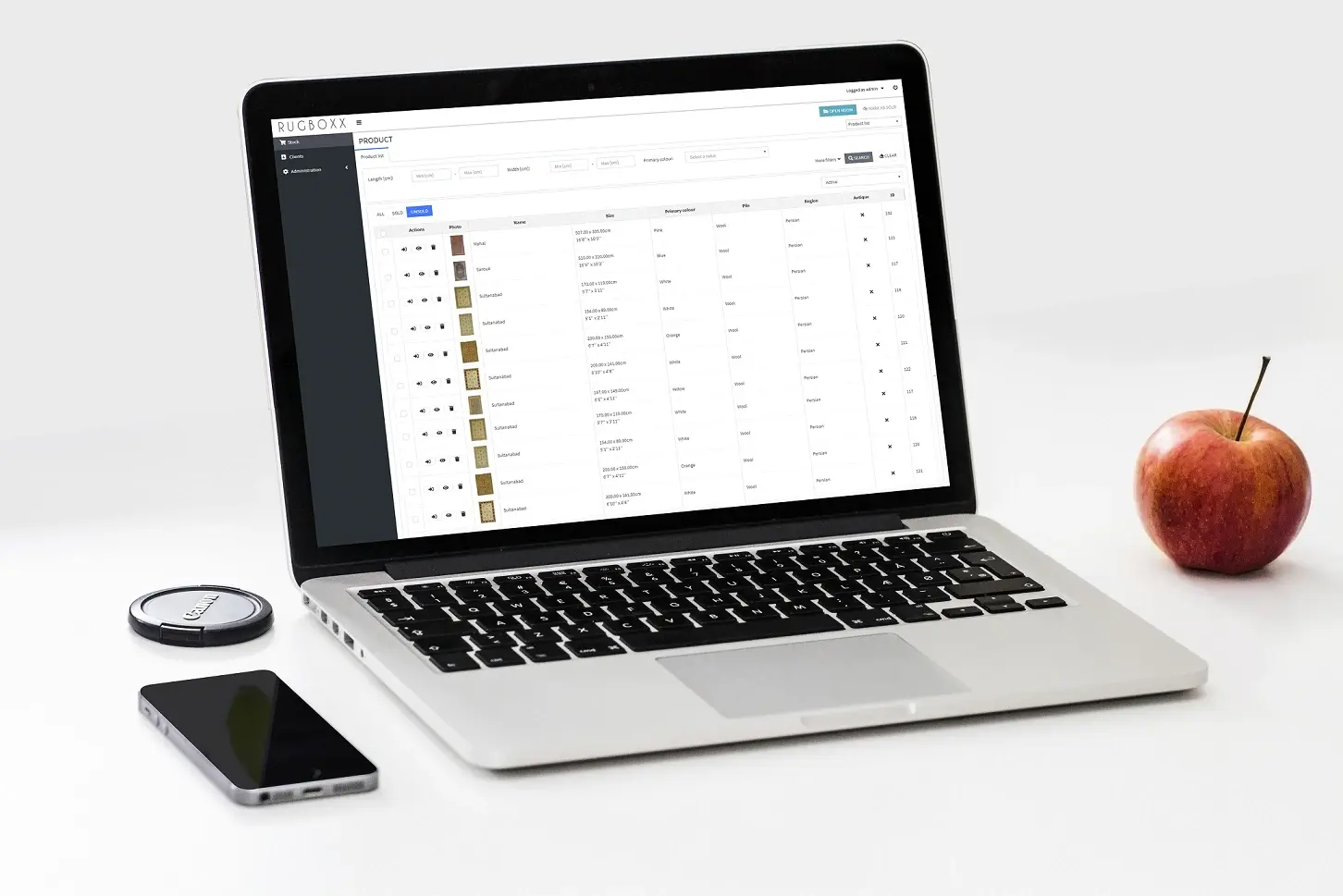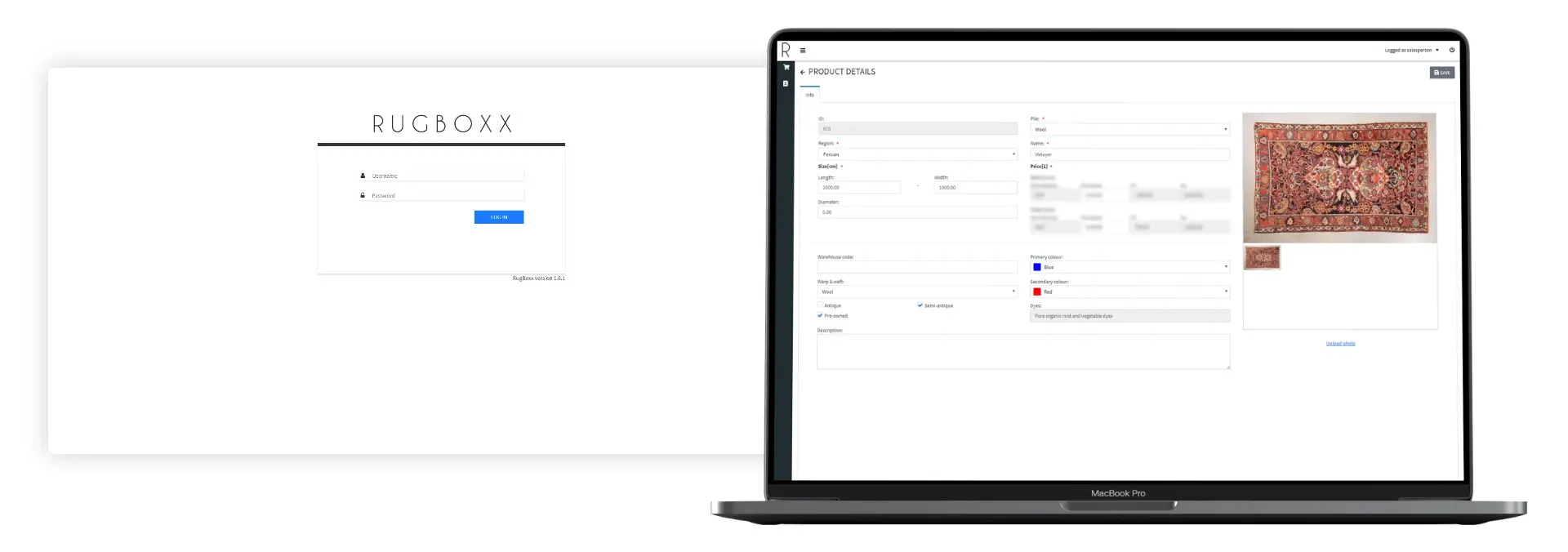
Two Custom Softwares & Complex Business Process Analysis
Custom software transforms rug company's data management and customer service.
Our Client.

The London Persian Rug Company is a reputable British business, renowned for their designer collections of antique, classic, contemporary, decorative and tribal carpets, rugs and runners. Their products are one-of-a-kind, and crafted from hand-spun wool, silk and cotton. The company strives to exceed customer expectations, delivering high-quality products with a matching high-quality service. They do this by getting to know the needs of each potential buyer, to support them in choosing a rug that is right for them. This is achieved by offering services such as measuring, home trial and a care and repair service.
Despite the impressive array of services that the business offers, the London Persian Rug Company was struggling to meet customer, employee and business needs. They realised that their management and sales software was failing them and it was at this point that we were invited to provide a solution to their problems.
The ingredients: what did we have to work with?
Before working with us, The London Persian Rug Company did not have appropriate management software in place. This meant that clients had to visit warehouses to view the company’s products instead of viewing them digitally – an inefficient and inconvenient method of operating for both the clients and the sales representatives.
Instead of dedicated software, Excel spreadsheets were used to support the management and running of their company. As the business grew, this started to create problems in the day-to-day operations of their business.
These problems included:
1. Problems managing data
Firstly, information was spread out between files. They had separate spreadsheets for each warehouse which made company data difficult to manage, and specific information difficult to locate and access.
2. Data became inconsistent and inflexible
Every employee had their own file with product details. With no shared, central source of information the company was at risk of inconsistent product information being held by employees. Further, each spreadsheet was at risk of becoming tailored to the person that managed it, and organised in a way that was meaningful to that person but not necessarily to everyone. This meant that if the spreadsheet was shared, or if that individual was replaced, there was a high risk of misinterpretation.
3. Inefficiency and inaccuracy
The more data that was being entered, the greater the risk of human error while inputting data. Furthermore, although Excel saves time during the data analysis stage, data still needs to be entered manually. This can be a slow and cumbersome process.
The first steps
The company tried to overcome the problems they were experiencing with Excel by replacing spreadsheets with a physical board. This solution helped to simplify ongoing tasks and provided more consistency. However, there was too much information for the board to clearly display and organise. In addition, employees could not access any information if they were not physically in the office. This limited what they could do outside of the office, and therefore constrained how effectively they could execute their job responsibilities.
The start of something new: a team effort
We were invited to create a bespoke solution for the London Persian Rug Company that addressed the difficulties they were experiencing, and supported their business goals. To do this, we first analysed the challenges they were experiencing. This included the problems created by their lack of a digitised catalogue of products, and the problems that Excel was creating. We worked closely with our client by engaging in extensive conversations, and holding regular workshops. This level of cooperation allowed us to create internal processes that supported their vision for the company, and was easily adapted to their day-to-day operations. Even more importantly, our cooperation helped us to prepare two custom software solutions that aligned with the company’s business goals.

Close cooperation and the client’s domain knowledge benefited the outcome. Our solution
We realised that what the company really struggled with was a lack of cohesion, caused by the absence of a centralised and collaborative space for company data that all employees could access. To address this problem, we configured a Trello app alongside our custom software. This supported each company department to keep up to date with company operations, and cooperate daily with each other.
The custom software we designed includes these features:
- The ability to collect, process and exchange data between various company departments
- The ability to cooperate between warehouses and sales departments
- A centralised and accessible catalogue of photos, prices, client contact information and information relating to products and warehouse stocks
- The ability to easily import data from previously created files and spreadsheets
- Mobile availability of all information, so that sales departments can access information from anywhere, at any time
The next phase is coming. The future of our partnership
We plan to enhance our bespoke solution for the London Persian Rug Company by incorporating the following features:
- Easily accessible stock for clients to view
- Profiling, product positioning and customer restricted data access. This will allow employees to share selective product information with their clients, position the offer among client groups and vary their prices for different groups to drive up revenue
- Specific product requests. This will support sales representatives to easily request a specific product from the warehouse in time for a visit from a prospective client

Key benefits of the software solution. Our success story
Our partnership with the London Persian Rug Company has benefited the business in a multitude of ways. These include:
- Facilitating greater cooperation between employees and especially between departments
- Improving accessibility of company information for all employees
- Improving the flexibility of company operations through the mobile service
- Saving the company money and time by reducing non-essential client visits to the warehouse
- Creating a hassle-free method of browsing products for clients
Project facts
- Team – Developers 5 (Team Leader, Full-stack dev, Mid backend dev, Junior backend dev 2), Architect 1, QA 1, BA 1, PM 1
- Project management – Waterfall for production and Kanban for maintenance
- Technology – NopCommerce, .Net Core & MVC, MS SQL Server, Razor views, jQuery, HTML, CSS, JavaScript